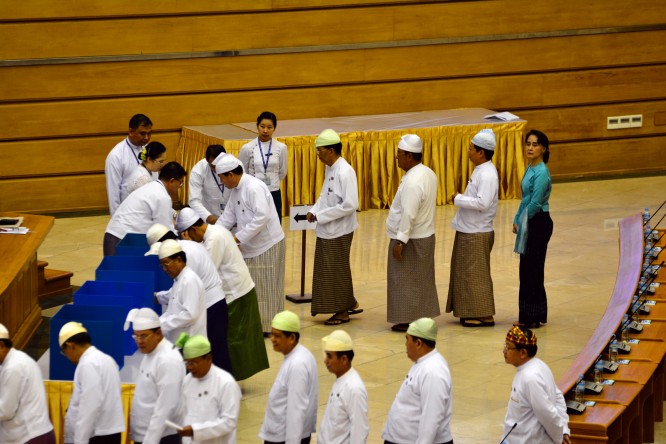Burma’s parliament on Thursday dealt what would appear to be a fatal blow to Aung San Suu Kyi’s bid to become president, voting down a motion to amend a constitutional clause that prevents her from seeking either the presidency or vice-presidency.
A further proposal that would have negated the military’s stranglehold on parliament also failed to gain enough support, falling short of the 75 percent of MPs’ votes required by the 2008 constitution.
After three days of debate in the bicameral parliament in Naypyidaw, MPs voted on a series of proposed amendments to the constitution, including the pivotal clause 436, which effectively enshrines the military’s veto, and Article 59(f) which bars presidential contenders who have direct family members with foreign citizenship, such as Suu Kyi.
The vote took place in the Pyidaungsu Hluttaw or Assembly of the Union, which is made up of: the Amyotha Hluttaw (House of Nationalities), a 224-seat upper house; and the Pyithu Hluttaw, a 440-seat lower house.
With a total of 664 MPs, a motion to amend any articles would normally require at least 498 parliamentarians – i.e., 75 percent – voting in favour of the change. Some 31 seats are currently unfilled, lowering the threshold. In addition, 50 elected MPs failed to show up for today’s session, and their absence essentially counted as ‘no’ votes.
The most significant proposal was to amend Articles 436(a) and 436(b), which dictate that a parliamentary majority of 75 percent is needed for the amendment of any constitutional article. In Burma, 25 percent of parliamentary seats are reserved for military MPs, effectively handing the army a veto.
Article 436 contains an added hurdle to the amendment of certain constitutional clauses, stipulating that a public referendum is required even after a 75 percent parliamentary ‘yes’ vote is achieved. Articles 59(f) and 59(d) fall under this condition.
On Thursday, the 388 votes in favour of changing both 436 articles accounted for 61 percent of MPs, falling below the threshold of 75 percent needed for them to pass.
The amendment bill was “not enacted”, parliamentary speaker Shwe Mann told the legislature.
The ballots in favour of changing Article 59(f) also fell below the mark with 371 parliamentarians voting for the amendment, just 58 percent of the eligible total of 633.
Article 59(f) states that Burma’s president and vice president must not “owe allegiance to a foreign power, not be subject of a foreign power or citizen of a foreign country.” The condition also applies to their immediate family. As Suu Kyi’s late husband was British and her two sons have UK citizenship, the failure to overturn this clause most certainly puts the nail in the coffin of her presidential ambitions – at least for the 2015 election.
Earlier this week, Suu Kyi said that “genuine change” in Burma was dependent on constitutional change, as she ramped up her rhetoric in a bid to swing the vote before elections slated for October or November.
Articles 60(c) and 416(a) were also voted down. The only motion passed on Thursday– with 556 votes in favour (88 percent) – was for an amendment to Article 59(d), which was a motion to replace the terminology of the article relating to a president’s qualifications – from having knowledge of “military” affairs to knowledge of “defence”.
“Despite the expectation that the bill would not pass, the legislature fell into silence as the results were announced,” AFP reported.
[related]
Reaction from MPs was also somewhat muted, though in a rare move, representatives of the ruling Union Solidarity and Development Party (USDP) voted out of step with the military.
Speaking to DVB after the parliamentary session, Saw Hla Tun, a lower house representative for the USDP, said, “We have always favoured charter reform, which is why we proposed these six amendments in the first place. We lost and there is not much we can do about it.”
Independent upper house MP Phone Myint Aung said, “Previously we thought the military and the USDP were one – walking the same walk and talking the same talk. I think the USDP wanted to boost their image by proving a point about Article 59(f). But it turns out the military is not with them on this. It is now obvious the army is not following U Shwe Mann’s lead.”
Meanwhile, Pe Than of the Rakhine National Party, was left to ponder the implications of lawmakers passing the single motion to amend Article 59(d).
“It was the only motion passing with over 75 percent of MPs’ votes. Now we should have a national referendum on it,” he said. “From my point of view, the terms ‘military’ and ‘defence’ are essentially the same … I do not think the public will pay much attention to a referendum to amend these words. It will just be a waste of the national budget. I just want to say to the public that I am sorry for this outcome.”



